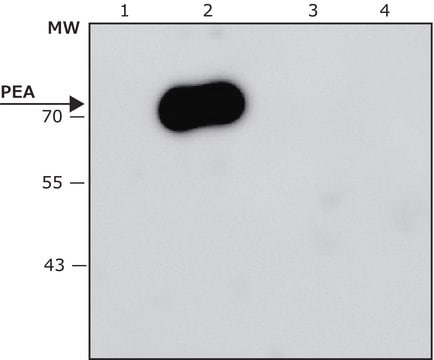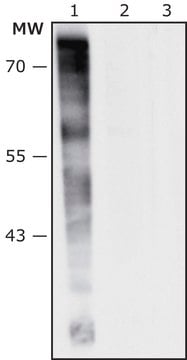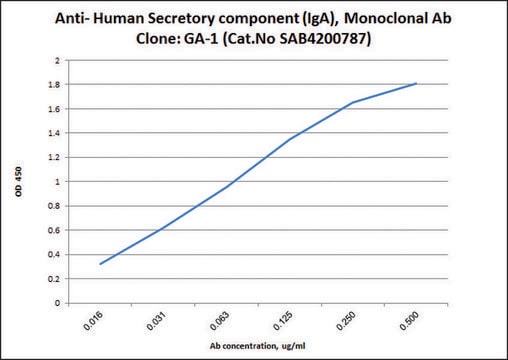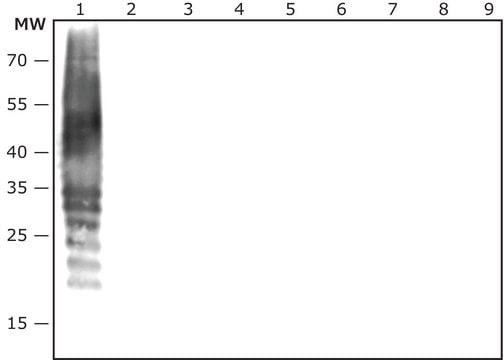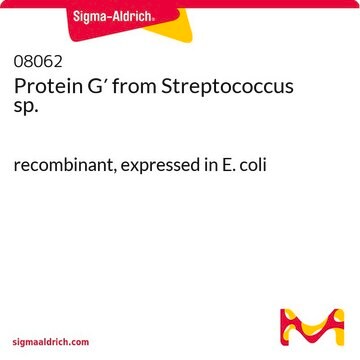SAB4200868
Anti-Enterococcus faecalis antibody produced in rabbit
IgG fraction of antiserum
Se connecterpour consulter vos tarifs contractuels et ceux de votre entreprise/organisme
About This Item
Code UNSPSC :
12352203
Nomenclature NACRES :
NA.43
Produits recommandés
Niveau de qualité
Forme
liquid
Espèces réactives
(Enterococcus faecalis)
Concentration
~1 mg/mL
Conditions d'expédition
dry ice
Température de stockage
−20°C
Modification post-traductionnelle de la cible
unmodified
Description générale
Enterococcus faecalis is a gram positive, non-motile, facultative anaerobic, coci-shaped bacterium.1,2 It is a commensal bacterium of the human gut and a major opportunistic pathogen in susceptible hosts.1 E. faecalis is the third most common pathogen associated with hospital-acquired infections.2 E. faecalis inhabits the gut in 80% of healthy adultsand is also a part of the oral cavity normal flora in 20% of the adult population. In addition, E. faecalis was also identified in the human urinary tract.1
Spécificité
Anti-Enterococcus faecalis antibody recognizes E. faecalis lysate and whole dead bacteria
Application
The antibody may be used in various immunochemical techniques including Immunoblotting. Detection of the E. faecalis bands by Immunoblotting is specifically inhibited by the immunogen.
Actions biochimiques/physiologiques
E. faecalis contributes to the host in several ways, such as, competing with pathogen bacteria and preventing them from reaching the gut epithelia, prevention of intestinal epithelial barrier leakage and provision of protection from pathogens to the young infant through breast milk consumption.1,3-5
Moreover, E. faecalis also has many effects on the immune system that are beneficial to the host, such as, promoting the secretion of anti-inflammatory cytokines IL-10 and TGF-ß and induction of IgA production.1,6,7
However, when the homeostasis in the gut and mucus barrier is disrupted, especially in susceptible individuals such as in inflammatory bowel diseases (IBD) patients, or upon antibiotic administration, E. faecalis might become an opportunistic pathogen. In such case, the bacteria population overgrows and translocates through the mucus barrier to reach the epithelial cells of the gut where it can enter the bloodstream and the lymphatic system and cause severe inflammation.
Moreover, E. faecalis also has many effects on the immune system that are beneficial to the host, such as, promoting the secretion of anti-inflammatory cytokines IL-10 and TGF-ß and induction of IgA production.1,6,7
However, when the homeostasis in the gut and mucus barrier is disrupted, especially in susceptible individuals such as in inflammatory bowel diseases (IBD) patients, or upon antibiotic administration, E. faecalis might become an opportunistic pathogen. In such case, the bacteria population overgrows and translocates through the mucus barrier to reach the epithelial cells of the gut where it can enter the bloodstream and the lymphatic system and cause severe inflammation.
Forme physique
Supplied as a solution in 0.01 M phosphate buffered saline pH 7.4, containing 15 mM sodium azide as a preservative.
Stockage et stabilité
For continuous use, store at 2-8°C for up to one month. For extended storage, freeze in working aliquots. Repeated freezing and thawing is not recommended. If slight turbidity occurs upon prolonged storage, clarify the solution by centrifugation before use. Working dilution samples should be discarded if not used within 12 hours.
Clause de non-responsabilité
Unless otherwise stated in our catalog our products are intended for research use only and are not to be used for any other purpose, which includes but is not limited to, unauthorized commercial uses, in vitro diagnostic uses, ex vivo or in vivo therapeutic uses or any type of consumption or application to humans or animals.
Code de la classe de stockage
12 - Non Combustible Liquids
Classe de danger pour l'eau (WGK)
nwg
Point d'éclair (°F)
Not applicable
Point d'éclair (°C)
Not applicable
Certificats d'analyse (COA)
Recherchez un Certificats d'analyse (COA) en saisissant le numéro de lot du produit. Les numéros de lot figurent sur l'étiquette du produit après les mots "Lot" ou "Batch".
Déjà en possession de ce produit ?
Retrouvez la documentation relative aux produits que vous avez récemment achetés dans la Bibliothèque de documents.
Notre équipe de scientifiques dispose d'une expérience dans tous les secteurs de la recherche, notamment en sciences de la vie, science des matériaux, synthèse chimique, chromatographie, analyse et dans de nombreux autres domaines..
Contacter notre Service technique
